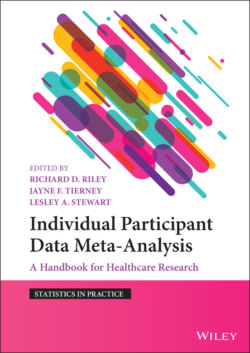Читать книгу Individual Participant Data Meta-Analysis - Группа авторов - Страница 44
3.5 Establishing a Team with the Right Skills
ОглавлениеAs for any research project, having the right team in place is vital. Before embarking on an IPD meta‐analysis project, it is important to think carefully about what skills and resources will be required for successful completion, and to calculate the associated costs if funding will be sought. Given the work involved, necessary skillset and timescale, IPD meta‐analysis projects require dedicated resources and would be very difficult to conduct in reviewers’ spare time. In particular, they generally require a broader range of skills and greater expertise in certain areas than is needed for a conventional review using aggregate data. A strong team will include researchers with experience in systematic review methods; information specialists; those who are able to manage, check and harmonise participant‐level data using data management and statistical software; statisticians able to implement appropriate statistical methods using suitable statistical software; and clinicians and health professionals with expertise in the topic area.
Assuming that a collaborative group approach is to be taken, the importance of skills in establishing and managing collaboration, negotiating provision of data, navigating politics and brokering a group consensus interpretation of findings cannot be overstated. A successful IPD meta‐analysis research team will, therefore, include members with strong communication and interpersonal skills who are able to build rapport and exercise tact and diplomacy when needed. Active involvement of senior researchers and topic experts with an appropriate track record can improve the likelihood of success, as they can enhance credibility and may gain or broker easier access to conversations with senior data holders and trial investigators.
The role of the research lead (usually the principal investigator for the IPD project) is particularly important. In addition to being responsible for the overall design and delivery of the project, they will usually be responsible for overseeing project management and the contributions of other team members, and will often undertake much of the negotiation and external communications activity (which can be very time consuming for some projects). Depending on their background, they may be directly responsible for supervising (or undertaking) the analyses, and at least should work with the senior statistician to agree the analyses required and subsequently on interpretation of results. Given the nature of the role, the research lead will be involved at all stages of the projects and more of their time will be required than for a principal investigator role in other types of systematic review. Ideally, they should have previous experience of completing IPD meta‐analysis projects, or have considerable support from someone who does.
IPD meta‐analysis projects require expertise in handling, coding and checking participant‐level data, skills that are perhaps more similar to those used in data management within clinical trials and other primary research studies than those used in a conventional systematic review. As standardisation and data checking require developing code and running analysis, it is important that the person performing this role has strong quantitative skills, although this may be a different person from the team statistician.
As is evident from Parts 2 to 5 of this book, the types of statistical analyses that can be performed with IPD are considerably more complex than those that are usually carried out for conventional meta‐analyses of existing aggregate data, and there is a risk of unknowingly introducing analytic errors, for example by accepting default options in statistical packages or when adapting existing code. Therefore, it is vital that the project team includes a statistician with experience of relevant analytic techniques, preferably someone who been part of an IPD meta‐analysis project previously, or familiar with appropriate modelling of large data from clustered sources such as healthcare practices or hospitals. They should also be familiar with the importance of building relationships with trial investigators and how this relates to data assembly, and recognise that analysis is not a stand‐alone activity. For this reason, ‘drafting in’ a statistician to focus only on the analysis is not advised; the statistician must be part of the central team, even if during some periods their involvement is less than at others. It can work well to have a highly experienced statistician, with an established track record in IPD meta‐analysis, to specify appropriate methods and oversee and guide the day‐to‐day work of a more hands‐on but potentially less experienced statistician.
